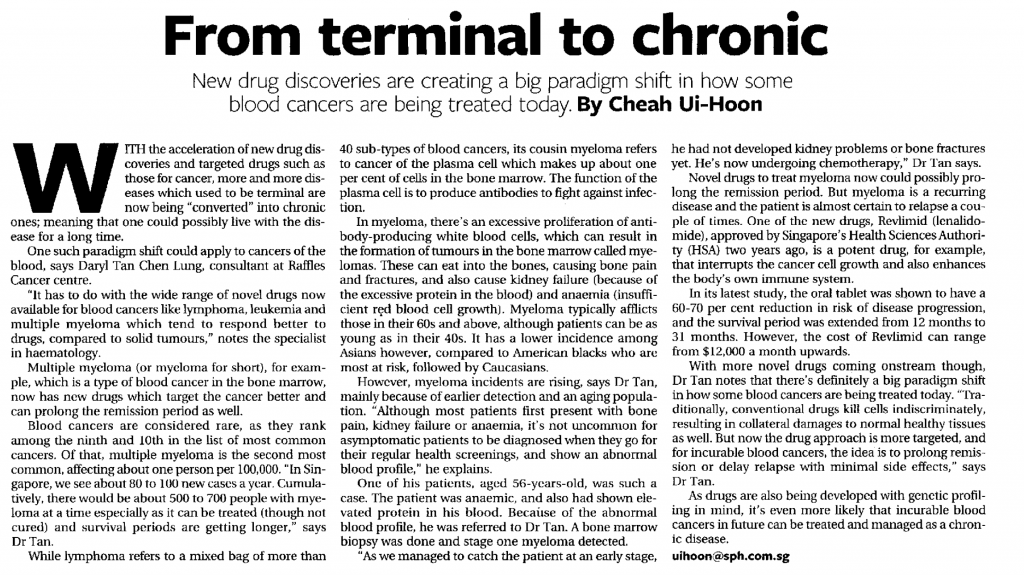From Terminal to chronic

With the acceleration of new drug discoveries and targeted drugs such as those for cancer, more and more diseases which used to be terminal are now being “converted” into chronic ones; meaning that one could possibly live with the disease for a long tune.
“It has to do with the wide range of novel drugs now available for blood cancers like lymphoma, leukaemia and multiple myeloma which tend to respond better to drugs, compared to solid tumours,” notes Dr Tan (specialist in haematology)
Multiple myeloma (or myeloma for short), for example, which is a type of blood cancer in the bone marrow, now has new drugs which target the cancer better and can prolong the remission period as well.
Blood cancers are considered rare as they rank among the ninth and 10th in the list of most common cancers. Of that, multiple myeloma is the second most common, affecting about one person per 100 000. “In Singapore, we see about 80 to 100 new cases a year. Cumulatively, there would be about 500 to 700 people with myeloma at a time especially as it can be treated (though not cured) and survival periods are getting longer,” says Dr Tan
However, myeloma incidents are rising, says Dr Tan, mainly because of earlier detection and an aging population. “Although most patients first present with bone pain, kidney failure or anaemia, it’s not uncommon for asymptomatic patients to be diagnosed when they go for their regular health screenings, and show an abnormal blood profile,” he explains.
One of his patients aged 56 years old, was such a case. The patient was anaemic, and also had shown elevated protein in his blood. Because of the abnormal blood profile, he was referred to Dr Tan. A bone marrow biopsy was done and stage one myeloma detected.
“As we managed to catch the patient at an early stage, he had not developed kidney problems or bone fractures yet. He’s now undergoing chemotherapy,” Dr Tan says.
Novel drugs to treat myeloma now could possibly prolong the remission period. But myeloma is a recurring disease and the patient is almost certain to relapse a couple of times. One of the new drugs, Revlimid (Icnalidomide), approved by Singapore’s Health Sciences Authority (HSA) two years ago, is a potent drug, for example, that interrupts the cancer cell growth and also enhances the body’s own immune system.
In its latest study, the oral tablet was shown to have a 60 70 per cent reduction in risk of disease progression, and the survival period was extended from 12 months to 31 months. However, the cost of Revlimid can range from $12,000 a month upwards.
With more novel drugs coming onstream though, Dr Tan notes that there’s definitely a big paradigm shift in how some blood cancers are being treated today.
“Traditionally, conventional drugs kill cells indiscriminately, resulting in collateral damages to normal healthy tissues as well. But now the drug approach is more targeted, and for incurable blood cancers, the idea is to prolong remission or delay relapse with minimal side effects,” says Dr Tan
Article Extract from The Business Times 11 Feb 2012



